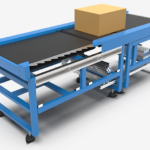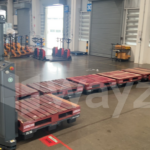The relentless pursuit of efficiency and speed defines the modern world, particularly in the intricate and dynamic landscape of logistics. In recent years, automation has emerged as a disruptive force, fundamentally reshaping the way goods are transported, stored, and delivered. From automated warehouses and self-driving trucks to AI-powered route optimisation, automation is not only transforming the logistics industry but also rewriting the rules of efficiency, accuracy, and cost-effectiveness.
Enhanced Efficiency: A New Paradigm
Perhaps the most profound impact of automation in logistics lies in its ability to significantly enhance efficiency. Repetitive tasks, once performed by human workers, are now handled by tireless robots, freeing up valuable human resources for more strategic and complex roles. This automation not only increases throughput exponentially but also ensures unwavering accuracy, minimising errors and delays that were once commonplace.
Inventory Management: A Crystal-Clear Vision
Automated systems offer real-time visibility and control over inventory, a crucial advantage in the fast-paced world of logistics. By tracking inventory levels and locations in real-time, businesses can optimise storage space, minimise stockouts, and significantly improve order fulfillment times. This heightened visibility extends to demand planning and forecasting, enabling more efficient resource allocation and cost savings that were once unimaginable.
Cost Reduction: A Compelling Argument
The economic benefits of automation in logistics are undeniable. By automating routine tasks, businesses can significantly reduce their dependence on manual labor, leading to lower operational costs. Additionally, automated systems optimise energy consumption and minimise waste, further contributing to cost reduction. These combined savings create a compelling argument for embracing automation across the logistics spectrum.
Accuracy and Error Reduction: A Commitment to Perfection
Automated systems are programmed to perform tasks with precision and consistency, reducing the risk of human error to almost negligible levels. This is particularly valuable in picking and packing, where even a single error can lead to incorrect orders and dissatisfied customers. Automation ensures accuracy and consistency, protecting businesses from reputational damage and costly rework.
Enhanced Safety: A Prioritised Objective
Safety is paramount in any industrial setting, and automation plays a vital role in enhancing safety within logistics operations. By removing human workers from potentially hazardous environments, automated systems protect them from injuries and accidents. This shift promotes a safer work environment and fosters a culture of risk mitigation within logistics organisations.
24/7 Operations: A Competitive Edge
Automation enables continuous operations, allowing businesses to fulfill orders and deliver goods 24/7. This increased uptime, once a distant dream, translates to faster delivery times and a significant competitive advantage in the ever-competitive logistics landscape.
Real-time Visibility and Tracking: Transparency and Control
Automation provides real-time visibility into the movement of goods throughout the supply chain. This allows businesses to track the location and status of their shipments in real-time, enabling proactive decision-making and resolution of any issues before they escalate. This transparency and control empower businesses to manage their logistics operations with unparalleled efficiency.
Improved Customer Experience: A Satisfied Endeavor
Automation ultimately benefits the customer by ensuring faster and more accurate deliveries. Customers can track their orders in real-time and receive timely updates on the status of their shipments. This transparency and efficiency cultivate customer satisfaction and brand loyalty, which are essential for long-term success in today’s competitive market.
Sustainability and Environmental Benefits: A Responsibility Shared
Automation contributes to a more sustainable logistics industry by reducing emissions and waste. Automated systems optimise routes and fuel consumption, leading to lower carbon emissions and a positive impact on the environment. Additionally, automated warehouses can utilise energy-efficient technologies, further reducing their ecological footprint.
The Future of Logistics: A Journey of Innovation
As technology continues to evolve at an unprecedented pace, the role of automation in logistics will undoubtedly expand. We can expect to witness the rise of even more advanced robots, AI-powered systems, and smart warehouses that will further optimise the flow of goods and revolutionise the industry.
However, it is vital to acknowledge that the implementation of automation comes with its own set of challenges. Significant investments are required, and potential job displacement in certain areas needs to be addressed carefully. As with any transformative technology, a smooth transition and social responsibility are crucial considerations.
Automation is not a mere trend but a transformative force that is reshaping the logistics landscape. By unlocking new levels of efficiency, accuracy, and sustainability, automation is paving the way towards a more optimised, cost-effective, and customer-centric future for the industry. We, at SmartLogitecX, supported by WayZim Technologies, embrace this technology with foresight and responsibility, ensuring a smooth transition and reaping the numerous benefits it offers, ultimately creating a more sustainable and prosperous future for logistics. With SmartlogitecX, you’re choosing a partner who understands the local market, backed by global expertise. Get in touch with the SmartlogitecX team today for a bespoke automation experience.



